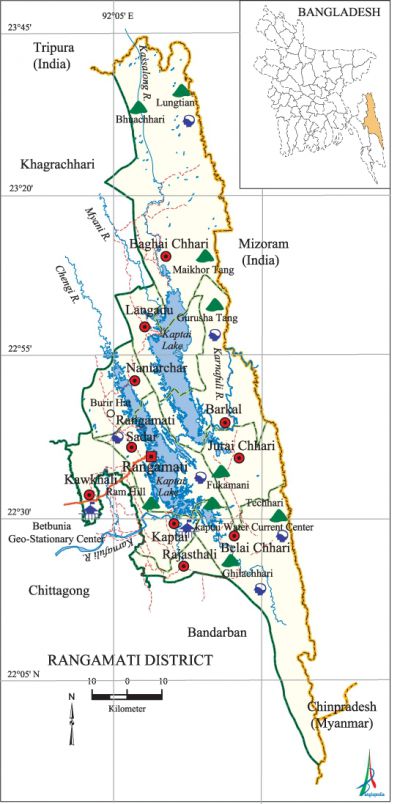Rangamati District
Rangamati District (chittagong division) area 6116.11 sq km, located in between 22°27' and 23°44' north latitudes and in between 91°56' and 92°33' east longitudes. It is bounded by tripura state of India on the north, bandarban district on the south, Mizoram state of India and Chinpradesh of Mayanmar on the east, khagrachhari and chittagong districts on the west.
Population Total 595979; male 313076, female 282903; Muslim 209465, Hindu 30244, Buddhist 347038, Christian 8663 and others 569. Indigenous communities such as santal, chakma, marma, manipuri, tanchangya, tripura, Bome, Chak, Khumi, Kheyang, lushei, Mro, Murang, pankho belong to this upazila.
Water bodies Main rivers: karnafuli, Kassalong, Chengi, Myani; Kaptai lake is notable.
Administration Rangamati sub-division was turned into a district in 1983. Of the ten upazilas of the districts baghaichhari is the largest (1931.28 sq km) and rajasthali is the smallest (145.04 sq km).
| District | |||||||||
| Area (sq km) | Upazila | Municipality | Union | Mouza | Village | Population | Density (per sq km) | Literacy rate (%) | |
| Urban | Rural | ||||||||
| 6116.11 | 10 | 2 | 49 | 162 | 1555 | 159627 | 436352 | 97 | 49.7 |
| Others Information of District | ||||||||
| Name of Upazila | Area (sq km) | Municipality | Union | Mouza | Village | Population | Density (per sq km) | Literacy rate (%) |
| Kawkhali | 339.28 | - | 4 | 10 | 180 | 59578 | 176 | 44.2 |
| Kaptai | 258.99 | 5 | 10 | 148 | 59693 | 230 | 60.0 | |
| Juraichhari | 606.05 | - | 4 | 11 | 105 | 27786 | 46 | 46.8 |
| Naniarchar | 393.67 | 4 | 20 | 158 | 43616 | 111 | 47.7 | |
| Barkal | 760.89 | - | 5 | 28 | 180 | 47523 | 62 | 44.5 |
| Baghaichhari | 1931.25 | 1 | 8 | 19 | 303 | 96899 | 50 | 41.9 |
| Belaichhari | 745.91 | - | 3 | 9 | 59 | 28525 | 38 | 32.8 |
| Rangamati Sadar | 546.48 | 1 | 6 | 21 | 178 | 124728 | 228 | 64.5 |
| Rajasthali | 145.03 | - | 3 | 9 | 106 | 26083 | 180 | 44.2 |
| Langadu | 388.49 | - | 7 | 25 | 138 | 81548 | 210 | 44.2 |
Source Bangladesh Population Census 2011,Bangladesh Bureau of Statistics.

Archaeological heritage and relics Palace, dighi and mosque of Raja Jan Baksh Khan, remnants of the residence of Raja Harish Chandra Roy (1873), residence of the Deputy Commissioner (1868).
War of Liberation Ranagamati district was under Sector 1 during the war of liberation. On 27 March 1971 a temporary training camp was established in the play ground of the Station Club to locally train freedom fighters. On 2 April the then Deputy Commissioner Hossain Towfiq Imam distributed a huge amount of money and arms and ammunitions (belonging to Police, EPR and Ansar) from the treasury to the freedom fighters. On 20 April Lance Naik munshi abdur rauf of 8 East Bengal Regiment alone destroyed 2 gun boats and one speed boat of the Pak army and drowned to death about one platoon Pakistani soldiers. In recognition to his heroic role he was awarded with the title Bir Srestha. There were Pak army bases at Barkal, Farua and Shukur Chhari in 1971. About more than one hundred freedom fighters were killed in encounters with the Pak army in Farua area. Rangamati district was liberated on 14 December.
Literacy rate and educational institutions Average literacy 49.7%; male 56.4%, female 42.3%. Educational institutions: primary teacher's training institute, polytechnic institute 1, technical training institute 1, college 13, pali college 3, secondary school 177, primary school 512, kindergarten 13, community school 10, madrasa 11. Noted educational institutions: Kachal Degree College, Rangamati Government College, Rangamati Government Mohila College, Kawkhali College, Bangalhalia College, Naniarchar College, Rajasthali College, Barkal High School, Narangiri Government High School, Ghagra High School, Mainimukh Model High School, Langadu Girls' High School, Naniarchar Islampur Dakhil Madrasa, Siddiqui Akbar Dakhil Madrasa, Betbunia Moinul Ulam Rezvia Dakhil Madrasa.
Main sources of income Agriculture 59.08%, non-agricultural labourer 6.06%, industry 0.46%, commerce 10.70%, transport and communication 1.06%, service 13.48%, construction 0.83%, religious service 0.19%, rent and remittance 0.73% and others 7.41%.
Newspapers and periodicals Daily: Giri Darpan, Rangamati, Parbatta Barta; weekly: Banabhumi, Parbatta Barta; monthly: School Barta.
Folk culture Biju Sangrai Baisabi festival, Hal Palani festival, Pala Gan, Pahari Lokageeti, Geeti Nritya Natak (dance drama),Garaiya dance, Jhum dance, Bamboo dance, Bottle dance are the prevalent folk culture of the district.
Tourist spots Rangamati Lake, Chakma Rajbari, Buddhist Vihara at Rajban, Hanging Bridge, Shuvolong Water Fall, Furaman Hill, Tribal Cultural Institute and Museum, Memorial Sculpture of the War of Liberation, Satellite Ground Station at Betbunia, Police Special Training School, Kaptai Hydro-electric Power Centre, Karnafuli Paper Mill. [Atikur Rahman]
See also The upazilas under this district.
'References Bangladesh Population Census 2001 and 2011, Bangladesh Bureau of Statistics; Cultural survey report of Rangamati District 2007; Cultural survey report of upazilas of Rangamati District 2007.
